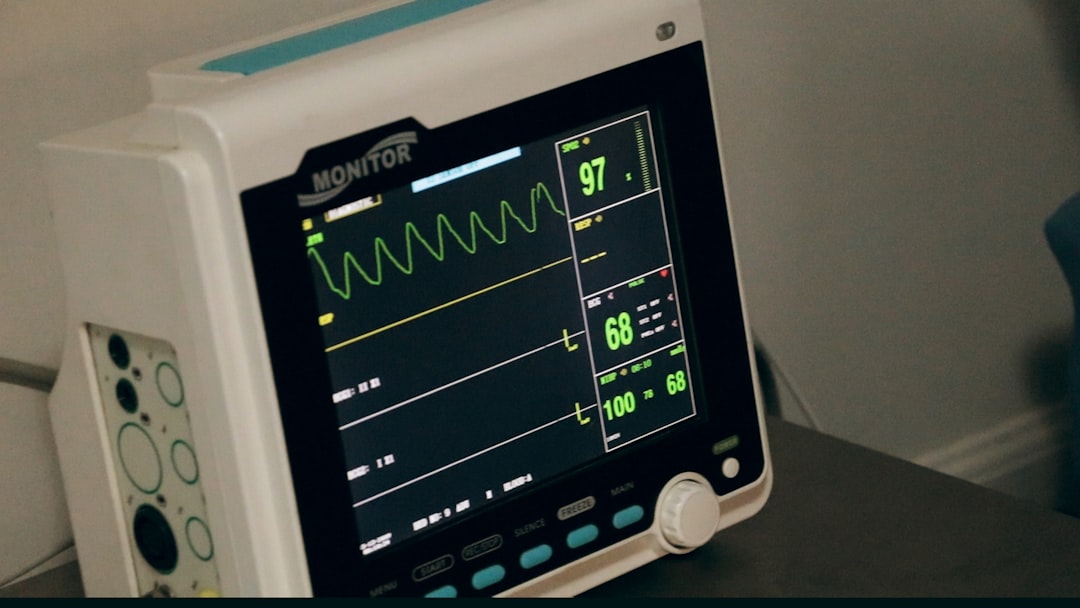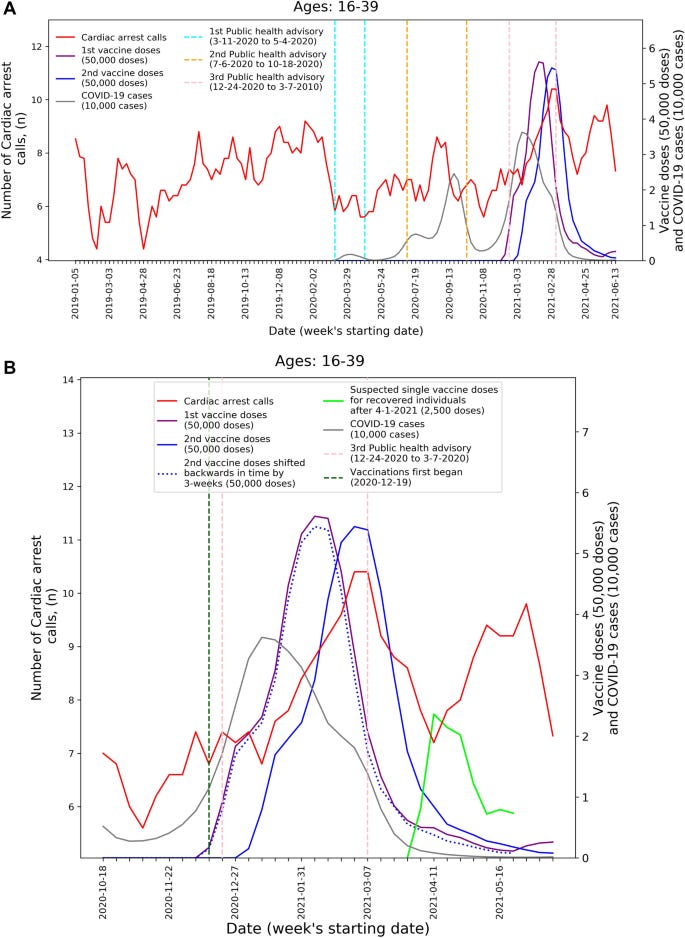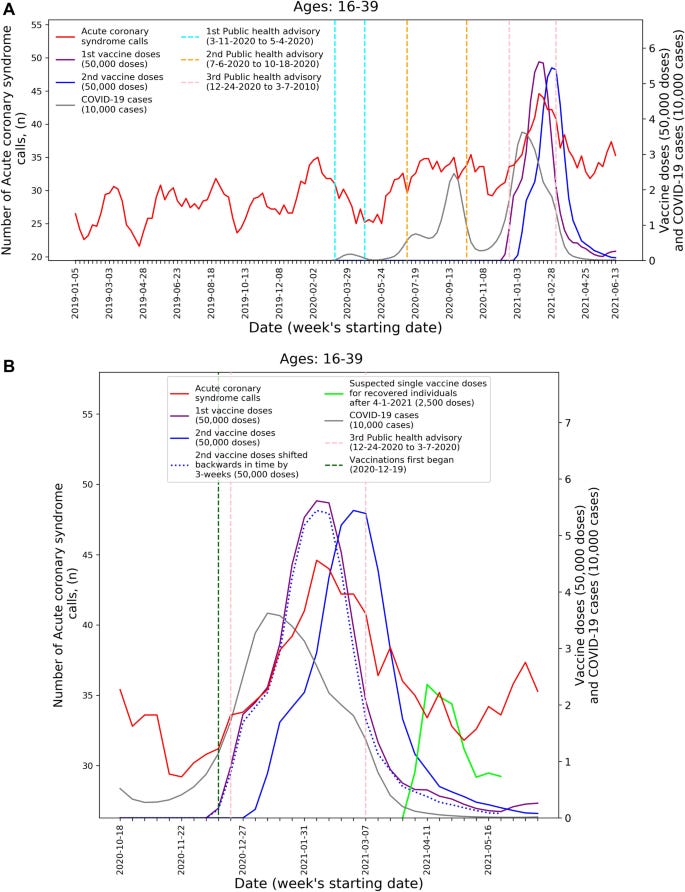Study in Nature finds >25% Increase in Cardiovascular events in under 40s during Vaccine rollout but NOT during Covid waves
MIT study using Israeli data
Your support is very much appreciated. Please consider taking out a paid subscription to support independent journalism.

A new study, released today in Scientific Reports and published in Nature magazine, looked at increased emergency cardiovascular events among the under-40 population in Israel during vaccine rollouts and a third Covid wave. It attempted to disentangle cardiovascular events and say whether they had been caused by Covid, lockdowns or vaccines.
The study was undertaken at the Massachusetts Institute of Technology using data from Israel between 2019 and 2021.
Several studies had already established a probable causal relationship between Covid vaccines and myocarditis, “primarily in children, young and middle-age adults.” An Israeli study estimated that for men between 16-24 there was a 1 in 3000-6000 chance of myocarditis. This was confirmed by the US Center of Disease Control (CDC).
Previous attempts to see if there was a connection between myocarditis and vaccines was difficult due to under and over-reporting problems of the self-reporting systems. Secondly, myocarditis can be asymptomatic (and so underdiagnosed) or misdiagnosed as acute coronary syndrome (ACS). Many studies have shown that myocarditis could be the cause for 12-20% of sudden, unexpected deaths in under 40 year olds. And thirdly, vaccine rollouts had often taken place during high community Covid infections, so attempting to see what had caused the heart problems was difficult.
To attempt to clarify what was causing cardiovascular problems, the authors looked at all emergency calls made in Israel using the call codes for cardiac arrest (CA) or ACS. This was done over 14 months prior to the Covid-19 pandemic and vaccine rollout (1/2019 - 2/2020), about 10 months of pandemic with two waves (3/2020 - 12/2020) and 6 months of pandemic (including wave 3) and vaccination rollout (1/2021 - 6/2021).
“Thus, it allows to study how CA and ACS call counts change over time with different background conditions and potentially highlight factors that are associated with the observed temporal changes.”
The authors found a statistically significant increase of 25.7% for CA and 26% for ACS for patients aged 16-39 during January - May 2021, compared with the same period during 2020. They did NOT find any statistically significant difference over the full year prior to the vaccine rollout and third Covid wave.
In the diagrams above, the red lines are CA calls, the purple line 1st vaccine doses and the blue line 2nd vaccine doses. As you can see CA calls peaked during the second dose rollout. The grey line is Covid-19 cases which doesn’t correspond to the increase in CA calls.
These charts show ACS calls. This time ACS calls peak during the first dose rollout. For both CA and ACS calls, there was no statistical significance during lockdown periods.
In both charts there is a second peak towards the end which seems to follow single dose vaccinations in individuals who had recovered from COVID-19 infections (green line). “This is consistent with prior findings that suggest that the immune response generated by a single dose on recovered individuals is generally stronger than the response to the 2nd vaccine dose in individuals, who were not exposed to COVID-19 infection”.
Interestingly, as I reported a few days ago in a different article, CA calls increased by 31.4% for females (compared with 25% for males) and ACS calls increased by 40.8% (compared with 21.3% in males). The authors suggest that whilst reports of myocarditis were predominantly in males, this may be due to underdiagnoses or under-self reporting for women.
The supplemental information showed an increase of patients that died on the scene in 2020 (pre vaccines) and this remained elevated post vaccines.
Several important policy implications are suggested by the authors in their conclusion.
First, it is important that surveillance programs of potential vaccine side-effects and COVID-19 infection outcomes incorporate… health data to identify public health trends and promptly investigate potential underlying causes. Specifically, prompt investigation is needed to better understand the potential underlying causes of the observed increase in cardiac-related… calls, including vaccine and COVID-19 infection related factors, as well as additional factors, such as reduced willingness to seek hospital or EMS care, reduced access to care, and increased public awareness to post-vaccination adverse events.
Second, it is essential to raise awareness among patients and clinicians with respect to related symptoms (e.g., chest discomfort and shortness of breath) following vaccination or COVID-19 infection to ensure that potential harm is minimized. This is especially important among the younger population and particularly young females, who often receive less diagnostic evaluation for adverse cardiac events compared to males15.
These implications are further underscored by the continued administration of additional vaccine booster doses to the public because of the waning vaccine immunity against COVID-19 variants (e.g., delta variant) after the 2nd vaccine dose.
In the interim, it is vital that following vaccination, patients should be instructed to seek appropriate emergency care if they are experiencing symptoms potentially associated with myocarditis, such as chest discomfort and shortness of breath, as well as consider avoiding strenuous physical activity following the vaccination that may induce severe adverse cardiac events.
Maybe if these suggestions had been incorporated during the beginning of the vaccine rollout, instead of the dogmatic insistence that vaccines were “safe and effective”, then probably a lot of lives would have been saved.





Anecdotal reports now supported by scientific investigation again.
And the highway signs downtown TO still say “protect yourself and others, get vaccinated”. 😡😡.